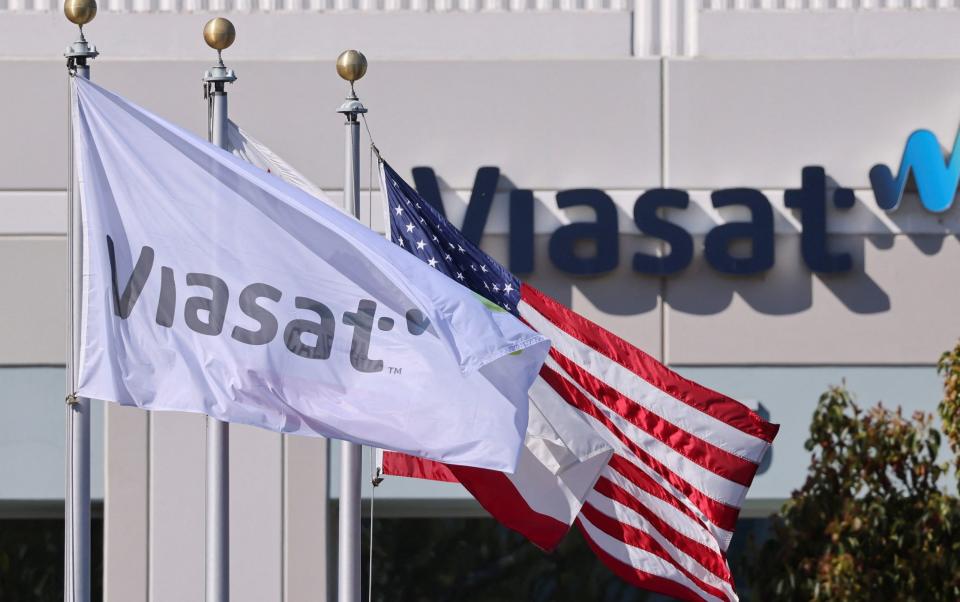US buyer of British satellites mulls sale of unit that encrypts UK data

Viasat, the US satellite company, is weighing up a sale of its encryption business which provides services to the UK government.
The Californian company, which is planning a $7.3bn (£6.1bn) takeover of British company Inmarsat, is understood to have hired advisers to explore a sale of its encryption software division.
The deal could fetch a price as high as $1.8bn, Bloomberg first reported, and could attract interest from the defence industry and private equity. The division, which encrypts sensitive data, communications and hardware for government clients, pulls in profits of around $120m.
A Viasat spokesman said the company “does not comment on rumours or speculation”. Viasat shares rose 9pc in early trading in New York.
The multibillion dollar takeover includes Viasat taking on $3.4bn in Inmarsat debt and raising a further $2.3bn in credit facilities to fund the deal. It is understood that a sale of Viasat’s encryption division could help reduce its debt pile, while focusing the business on its core satellite arm.
Viasat’s encryption business is understood to include a UK arm, called Stonewood, that the company acquired in 2010 for $20m. According to a statement published at the time, Stonewood’s products are “used to encrypt data on computer hard drives so that a lost or stolen laptop does not result in the compromise of classified information or the loss of intellectual property”.
The potential divestment comes amid a flurry of dealmaking in the satellite business as companies look to consolidate to build scale to take on new rivals such as Elon Musk’s Starlink.
Mr Musk has launched 4,400 satellites for his Starlink constellation, targeting consumers with satellite broadband in remote areas. The Tesla billionaire is also planning to launch services such as in-flight Wi-Fi, taking on incumbents such as Viasat whose clients include Virgin Atlantic.
Viasat last year confirmed it planned to merge with rival satellite company Inmarsat, which was previously listed on the London Stock Exchange before its private equity takeover.
The deal has faced scrutiny from British officials because of Inmarsat’s work with the Ministry of Defence.
The two companies reached a deal in March with the Business Department to protect Inmarsat’s UK business and invest in Britain. The combined company would boost R&D spending in the UK by 30pc, create a UK-based board of directors for Inmarsat activities and establish a joint headquarters in London. Viasat is also planning to invest £300m in Britain over the next 10 years.
The merger between the two companies is facing the prospect of a competition investigation in the UK. The Competition and Markets Authority said on Monday it was considering whether to launch a full inquiry into the deal. Mr Musk’s Starlink has previously written to US regulators opposing the deal.
The combined company will operate 19 satellites providing telecommunications services to airlines, shipping and governments.
On Monday, OneWeb, a rival to Inmarsat and Viasat partly owned by the British taxpayer, confirmed it would combine with France’s Eutelsat, a satellite TV broadcaster.
OneWeb is developing a constellation of 650 satellites with the aim of taking on Starlink in the race to provide satellite broadband connections across the world.
The British and French states will both have stakes and board seats in the combined company, whose other shareholders include Indian billionaire Sunil Mittal and Japan’s SoftBank.
Eutelsat shares plunged 17pc on Monday on news of the deal. OneWeb is expected to require billions of pounds more in investment to keep pace with the ambitions of Mr Musk, the world’s richest man, who controls rocket company SpaceX and satellite company Starlink.
Eva Berneke, Eutelsat’s chief executive, said the deal would “create a powerful global player” with “financial strength and technical expertise”.
